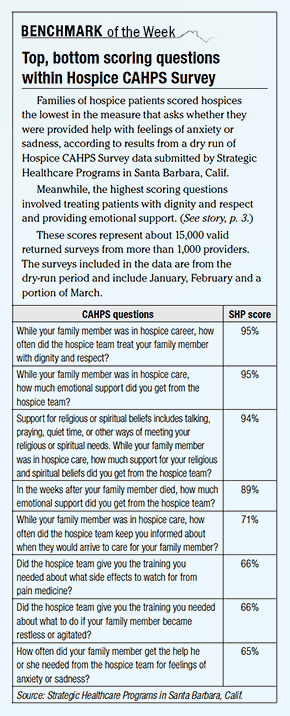SHP’s Dry Run Results of CAHPS Hospice Data in Home Health Line
Republished with permission from Decision Health. Article originally published on Home Health Line July 27, 2015.
Educate your hospice patients and their loved ones multiple times about potential medication side effects. Doing so could prevent a hospital visit and it also will help your hospice improve on one of the lowest scoring items on the Hospice CAHPS Survey.
Santa Barbara, Calif.-based survey vendor Strategic Healthcare Programs (SHP) on June 29 provided HHL an early look at CAHPS questions with the highest and lowest scores.
That data, which came from the survey’s dry run period from January through March 2015, represent about 15,000 valid returned surveys. (See benchmark, p. 4). Although the survey officially launched April 1, the official data is not yet available.
“CMS has not yet indicated when it will be available,” says Katie Wehri, hospice operations expert for the National Association for Home Care & Hospice. “We do know from the proposed rule that there will be a Hospice Compare website similar to the other compare sites but do not yet know, exactly, what will be on it. We suspect it will eventually include CAHPS information.”
With SHP’s dry run data, the question “Did the hospice team give you the training you needed about what side effects to watch for from pain medicine?” received a 65% score.
Fortunately, there are several things a hospice can do to improve in that area, Wehri notes.
For instance, clinicians should tell patients and their family members several times about the potential side effects the pain medication might cause. And keep the conversations about medications simple, adds Julia Maroney, a senior manager with Simione Healthcare Consultants in Hamden, Conn.
Patients and their families might be highly stressed, and sometimes they might not hear or remember what the clinician is telling them about medication side effects the first time the effects are discussed, she says.
How to educate about side effects
• Use the words “side effect” when describing the potential issues patients may face. Many times, instead of using the words “side effects,” clinicians may use phrases such as “adverse effects,” says Diane Link, senior clinical consultant with Conshohocken, Pa.-based BlackTree Healthcare Consulting.
If a clinician doesn’t actually use the phrase “side effect” during such conversations — even if she discusses what the side effects are — the loved one filling out the CAHPS survey months later might not remember or realize he had been educated about side effects, Wehri says.
When medication is given to the patient to begin use, it’s important to explain what the medication is, what purpose the medication serves, how the medication should be administered and what side effects the patient might have, Wehri adds.
• Provide within the patient’s admission packet a written list of common medications used for pain management. The list should include the most common side effects and ways that the caregiver can help watch for and manage side effects, Link says.
• Make sure on-call nurses properly communicate and document any changes in medication. That way when a nurse goes to visit a patient, she’s made aware of any changes in medication since the last visit.
• Educate patients and loved ones several times about potential medication side effects. And keep the conversations about medications simple, says Julia Maroney, a senior manager with Simione Healthcare Consultants in Hamden, Conn.
Patients and their families might be highly stressed, and sometimes they might not hear or remember what the clinician is telling them about medication side effects the first time the effects are discussed, she says.
— Josh Poltilove (jpoltilove@decisionhealth.com)


 Click to Enlarge
Click to Enlarge